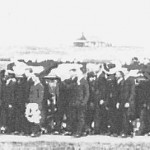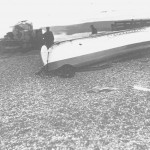November the fifteenth is the seventy fourth anniversary of The Mary Stanford Disaster. All seventeen crew of the Rye Harbour Lifeboat were lost in 1928 when going to the aid of The Alice of Riga. A Memorial service will be held on the 17th November at 3pm, in Rye Harbour Church.

In memory of those heroes we reproduce the words uttered by some of the people directly involved, which were broadcast in 1958.

Ned Adams (Ex coxswain of the Hastings Lifeboat)
I think in living memory, in my memory, in any case, ever the worse ever I see it. I was coxswain of the Hastings lifeboat for eight and a half years, and when we capsized that day, I don’t think was so near as bad as it was when Rye Harbour disaster occurred. But, the thing that sticks in my memory most, is how that man managed to get her away from the shore, under oars and sails I can’t imagine how he done it. When we capsized we had power, but however that man got away from the shore with sails and oars, God above knows, I don’t.
Denys Cutting (Lost three brothers and a brother-in-law)
Well I lost three brothers and a brother-in-law, in this lifeboat disaster and I was on the end of the rope launching her that morning. Very rough and everyone done the best they possibly could. Don’t think the boat would ever have got off if the crew hadn’t got out and helped launch her. As we were launching her the sea broke right over our heads and well everyone was wet through including the crew before they got aboard the boat.
Frank Saunders (Launcher)
It was blowing a full gale and of course you realised the distance we had to travel before we reached the boathouse across rough shingle and fields, fences, obstacles of various kinds, in the pitch dark. A journey of approximately a mile and a half from the village to the boathouse and I don’t suppose unless anybody knows the coast the difficulties of launching a lifeboat by manpower across this type of shore. Being so very flat its entirely in contrast to many lifeboat stations where the boats are launched from a slipway. I’d like to emphasise this boat had to be pulled by the launchers and the crew themselves. We had to pull it, as I said, across approximately one hundred yards of beach and equally the same distance across flat sand, walking into the water until we got depth enough for the boat to float, and this meant some of our launchers, the foremost launchers on the ropes had to be in water up round their shoulders.
George Igglesden (Lost his brother)
Yes my brother was working on the Dutch dredgers, that morning when he came home, his father said ‘Go to bed my son,’. When the rocket fired, he said ‘No, it is my duty, and I’m going’.
Mrs Newton (The Vicar’s wife)
We saw her return, when she was some distance from the harbour, we suddenly saw the mast go over, and the vicar said ‘She’s capsized’. Then we saw the man from the beach, he was running up, he vaulted the low vicarage wall, we were down to meet him, and he said ‘Oh sir, she’s capsized’.
And I think I shall never as long as I live, forget the sight of seeing the vicar kneeling on the beach, and the women of the village kneeling with him and the rain coming down like knitting needles. They were praying, well of course the bodies in the end were eventually brought back to the harbour and put in the fishermen’s room. All the coffins of course were alike and just the words ‘Died Gallantly’ put on, but I’ll never, never, never forget the bravery of those women. They should go down in history.
Mrs Mills, (Then living at Camber)
It was on my daughter’s second birthday, and my husband was lying ill in bed at the time, and I heard a maroon go, calling the lifeboat out, and went to the top of the dunes to see what was happening. I saw the lifeboat one moment, it was gone the next. So I ran back to the bungalow and made up all my beds, so all the available beds which were about four or five I suppose, and put bottles in them in the hope that I might have been of some service, but alas it was too late. Everybody died in the lifeboat.
Mrs Newton (The Vicar’s wife)
The day of the funeral came and really I never, never would have thought that anything of the sort could possibly have happened. Early in the morning the crowds began to come. We had the graves all covered over with boarding because we couldn’t get into the church, there were over a thousand wreaths. It’s only a little church, and they were on the altar, in the chancel, in the pulpit, down the isles and in every pew and right at the back of the church, the public couldn’t get in at all, there wasn’t room. So with the churchyard being boarded over the funeral was held around the big open grave, and that was a most remarkable time, you could have heard a pin drop there wasn’t a sound.
Frank Saunders (Launcher)
Well on the day of the funeral, my brothers and myself were to be bearers to one of my cousins, and I had two or three trips to Rye to fetch relatives and friends, to be here for the actual funeral, and I know the last trip I made, I only managed to get just Rye Harbour side of the Chemical Works, it was just chaos I couldn’t get any farther at all. I had to pull the car off the road, and finished by running the last three quarters of a mile, to be there in time to take part in the funeral procession.
Jack Saunders (Lost three cousins)
I lost three cousins, and we attended the funeral, and me and my three brothers carried one of our cousins, at the funeral. Look I believe to be correct there were one hundred and twenty pall bearers, which was made of the inhabitants of the village and it was made up with the British Legion, and we had a very big day here, and I’d never seen so many people in my life, not in this place.
Mrs Stoneham (Widow of the 2nd cox)
Well I didn’t think I had so many friends, good friends, it was amazing the amount of letters and also presents from people. Perfect strangers, and one sent a lovely doll for my daughter, and she’s still got it.
Mrs Head (Widow who lost her husband and two sons)
Well we was in bed you see. I forget what time it was in the morning, it was early in the morning, well anyway, we were in bed it was a very rough night it was blowing very hard, raining. And presently I heard the lifeboat gun fire and my son Jack in the next bedroom, he jumped out of bed, dressed and came down stairs and he was out of the door before his father and his other brother could get going. And I called out to Jim, the other boy to wait for his father because it was so dark and rough, and he did wait for him and then his father came back upstairs, to say so long to me, and I ask if he would be alright and he said ‘Yes, don’t worry, we shall be alright’. And that’s how they went. That’s just how I… they went away from me home. I wondered how they got up to the boathouse, being such a dark rough night. I couldn’t think how they could find their way up there. I always have wondered about that. I’ve never, em never been able to go up to the lifeboat house, I’ve often wanted to but never got my heart up high enough to go up, and go over that path where they went.
These words allow us a small insight into the heroics of the men that perished but also the great stoicism, strength of character and willingness to help others as portrayed by the families of Rye Harbour. Long may we remember the sacrifice these families made then and still make now to ensure the safety of all at sea.
(Article produced by Paul A Kennedy (A second cousin to Charles Southerden) who is compiling a complete history of the Mary Stanford and can be contacted on 01759 301065)
From the November 2002 issue of “Rye’s Own”
All articles, photographs and drawings on this web site are World Copyright Protected. No reproduction for publication without prior arrangement. © World Copyright 2015 Cinque Ports Magazines Rye Ltd., Guinea Hall Lodge Sellindge TN25 6EG
